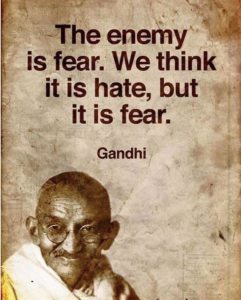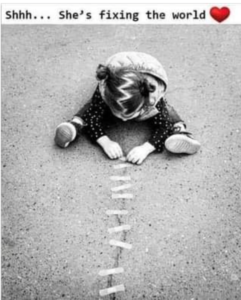This is one of the most challenging posts for me to write because it directly relates to one of the biggest concerns we face today as families, communities, faith communities, and certainly as a country. The increasing division seeping into most aspects of our daily life has become cancerous!
It feels as if I see evidence of this growing societal cancer on a near-daily basis. Here are just a handful of the many examples which continue to confirm my growing concern:
Not long ago I had my first couple request marital counseling because they had become a “red-blue marriage,” a term I had never heard before! How was a marriage of over thirty years, which both described as “good through a lot of ups and downs,” suddenly on the brink of divorce because of the spouses’ decisions—conscious or unconscious—to completely line up with a specific political party?
Early on in their counseling I suggested taking one current social issue and have them attempt to set aside the position they felt their particular party was promoting and instead try to listen to each other with no need to defend a position. The issue I chose to start with was one on which they were deeply divided: gun control.
We quickly began to explore a variety of emotions that were, to a large degree, driving their somewhat extreme positions. One very prominent emotion for both of them was the same: fear! I find fear to often be the main driving factor when discord, division, and conflict develop.
 The husband’s fear was being unable to protect his family when “they” would come to take away all he had earned and needed to survive. He also expressed a fear that if “his” party agreed to any type of compromise, the other side would quickly take all guns away from its citizens. The wife also had considerable fears, one being that a person with an automatic weapon would enter one of the schools where their young grandchildren attend and kill them!
The husband’s fear was being unable to protect his family when “they” would come to take away all he had earned and needed to survive. He also expressed a fear that if “his” party agreed to any type of compromise, the other side would quickly take all guns away from its citizens. The wife also had considerable fears, one being that a person with an automatic weapon would enter one of the schools where their young grandchildren attend and kill them!
We began to investigate where each of them gathered the supporting data for their fears and made substantial headway in listening to and being compassionate toward each other’s fears. Eventually we were even able to come to some areas of agreement such as the value of background checks.
I was pleased with the progress they had made in finding some common ground but then the most interesting thing happened. Instead of being eager to share their success, each of them—especially the husband—was quite reluctant to disclose to anyone—including their own children—the areas of agreement they had come to in our counseling session!
Was he fearful of judgment and possible rejection by his like-minded peer group? Do we all have some fear of that happening to us if we question, moderate, or diverge from our group’s positions? Again, one more fear that is having a profound effect on our healthy decision making and our overall communal wellness!
A second incident occurred with an old friend who sadly informed me that his family was selling their three-generation hunting camp, also used for family celebrations and shared vacations, because it had become “a political battleground” instead of the peaceful retreat it once had been.
“Everyone’s even fighting now over how to divide up the money for the property,” he told me. “This is new behavior I haven’t witnessed in our family before and would never have imagined a few years ago.”
“Terry,” he continued, “with everyone living several hours apart, demanding jobs, kid’s sport schedules, etc. this old hunting camp, which my father and two of his brothers bought and built years ago, was the ‘crazy glue’ that seemed to hold our family together. Everyone looked forward to catching up, reconnecting and celebrating milestones—even the teenagers in the family!
 “I never dreamt politicized issues would ever destroy our family this way. We lost our ability to honestly listen and talk civilly to one another. It’s become “my way or the highway!” The worst part is I don’t know how to fix it. Most everyone got angry when I suggested we sit down together to discuss a positive way forward, it actually felt like they were more afraid than angry. What could they be afraid of, Terry?”
“I never dreamt politicized issues would ever destroy our family this way. We lost our ability to honestly listen and talk civilly to one another. It’s become “my way or the highway!” The worst part is I don’t know how to fix it. Most everyone got angry when I suggested we sit down together to discuss a positive way forward, it actually felt like they were more afraid than angry. What could they be afraid of, Terry?”
The despair on my friend’s face was haunting. Again, as in the first scenario, fear seemed to be the dominant emotion. Unaddressed fear can quickly become fertile soil for mistrust, increasing fear, and unpredictable anger.
Hearing about this situation even raised my own fear level! Just seeing this level of pain— especially with this sensitive patriarch—and hearing about the conflict in what I believe was a close and loving family reinforces my concern about how the growing division in our society is impacting families, friends, and communities across the board. To be honest, it is creating more fears within myself than I can remember ever having!
A third incident involved a second-career college student with dreams of entering politics, who said with significant emotions, “My goal as a possible candidate would be to focus only on explaining my positions on the important issues facing us, why I feel they are important, and how I plan to address them. I would commit to not attacking or speaking negatively about my opponents and not accepting any type of contributions that may affect my ability to make the best decisions for all folks, not just for those who voted for me. I’m slowly and sadly coming to believe this is beyond idealistic!”
“Why are we so afraid to consider a different—and I believe healthier—alternative to this whole election process?” she asked. “Is it a fear of losing control?”
This conversation jerked me abruptly from hope to despair! How could I encourage and support this woman while acknowledging at least some degree of reality?
My only response was, “Your future goals give me hope but I fully understand if you choose a different career!” Reflect with me for just a moment on how this young woman’s “beyond idealistic” approach to an elected position could possibly help heal this cancerous division?
Communities of faith are not immune to the division. I’ve had folks from many churches and denominations share with me how their faith community began to splinter because some real social issues—which had the potential to actually build up the community if honestly and faithfully wrestled with—became highly politicized and eventually shifted their focus from outreach mission, in both their immediate community and beyond, to growing arguments about “who was right and an even stronger emphasis on who was wrong!” Many seemed petrified to set aside their self-assigned political party positions for one hour in order to honestly listen to one another and explore a healing path forward!
One long-time leader of a nearby church explained, “It seemed like the largest group to leave the church was those who could no longer tolerate the increasing tensions, growing judgment, and some deep fear of listening and trying to understand the other person’s view or position.”
A congregation member said, “For my husband and I, it was the loss of focus on fostering community within and beyond the walls of our building through inclusivity and mission.”
I have had many more such encounters over the past few years which have and continue to move us toward—to introduce a term I haven’t used before—communal illness!
I ran this topic by a few friends and colleagues and one woman said she hoped I could provide some practical suggestions to this growing division all around us.
My response was simply, “I’m not sure I will be able to provide any helpful suggestions, but one thing I do know is that the healing and building up of communal wellness requires considerable creativity, flexibility, commitment, gumption and a deep understanding of how absolutely critical it is if we are going to survive and hopefully thrive in this amazing world we have been blessed with!”
I have witnessed some approaches being effective in certain situations and relationships and at other times being totally ineffective! My approach of attempting to just listen and understand the other person’s position has failed more than it has succeeded; however, when we have been able to make progress, it has brought amazing depth into our relationship.
A very close friend of mine often chooses to focus, not on differing positions, but on what they have in common and showing compassion and understanding when opportunities arise. This works for her—and for me on those occasions when I can set aside my need to “fix” everything!
 There is also a growing international group called Braver Angels that is dedicated to political depolarization between members of both parties—often passionately opinionated!–to attempt to better understand each other’s positions through engaged civil dialogue. If you share my concerns regarding the growing division, please consider checking out them at braverangels.org and if you do, drop me a line to let me know what you think.
There is also a growing international group called Braver Angels that is dedicated to political depolarization between members of both parties—often passionately opinionated!–to attempt to better understand each other’s positions through engaged civil dialogue. If you share my concerns regarding the growing division, please consider checking out them at braverangels.org and if you do, drop me a line to let me know what you think.
Another proactive step you can take—one that doesn’t require anyone else’s participation—is focusing on your own fear. The first question for myself is often, what am I afraid of? What is the basis of my fears? These two core questions usually allow me to identify other critical questions that I usually need to wrestle with before I can begin to move forward.
I am reminded of something I first heard in American History class. Not to suggest that I actually paid attention way back then or remember much of what was taught, but for some reason sayings, quotes, proverbs, etc. have always had a way of lodging themselves in the remote crevices of my gray matter. Perhaps you’ve heard it, too. It was a quote from Franklin D. Roosevelt’s 1933 inaugural address: “We have nothing to fear but fear itself.”
At the time this particular quote made no sense to me but I expect that is the exact reason it stayed with me! Now that I’ve become more aware of the effects of fear, it makes much more sense to me. Sometimes fear can be healthy—a friend warning us of danger—but far too often it is our foe, leading us down the path of mistrust, dehumanization, and deep polarization and division. And perhaps those are themselves the greatest danger we face.
QUESTIONS FOR DEEPENING THE SPIRITUAL JOURNEY:
- Where have you experienced or observed any level of political division in your family relationships, friendships, or in other communities or relationships?
- Have you or anyone else acknowledged the division and attempted to address it in any way? If not, was there some level of fear of the outcome and was your fear friend or foe?
- If you did attempt to address the differences, what approach did you use and how successful was your efforts?
- Many folks respond to the growing division by setting boundaries (i.e. we agree to not discuss religion or politics, thus not allowing any conversation about any of the critical issues facing us today). If you or someone else chose to use this strategy, how has it affected relationships, especially long term?
- Have you experienced or are aware of a faith community that has experienced some level of division or conflict over the past few years? If so was their response consistent with what they profess as a faith community?
- What would you have said to the patriarch had he come to you regarding the need to sell the family’s cabin?
- How would you have responded to the second-career college student who was considering a career in politics?
Banner photo by James Coleman on Unsplash.com


When I was a girl, teachers would tell us kids to remind our parents to vote. My parents never did. I finally asked my mom why they didn’t. She explained that her family always voted straight Republican and my dad’s family always voted straight Democratic. When they got married they realized if they followed this pattern they would cancel out each other. So they decided they would not vote, and I never heard political talk in my house. It worked for them.
Super insightful and heartfelt Terry. Thank you for addressing this issue with love and candor. Your advice is very helpful, as well as the Ghanaian quote; I will check out the Braverangels website. May God bless us all
Thank you Terry. There is a lot of good stuff in this one on an issue that needs a real effort locally and nationally.
One more thing:
When President George Washington left public office, he cautioned the nation not to divide themselves into political parties. In his farewell address, he stated that the spirit of the party, “serves always to distract the public councils and enfeeble the public administration. It agitates the community with ill-founded jealousies and false …
I have to admit there are numerous times I have avoided certain conversations out of fear that I would rather not be drawn into lengthy unpleasant discussion. Yet, I usually walk away knowing that nothing has been resolved. More recently, I have started to lister more to the other side by asking “why,” which helps me remain calm and perhaps open to a compromise that I had not considered.
Thank you, Terry, for this insightful piece. We have forgotten how to engage in respectful face to face dialog with each other. Social media allows to hide behind faceless words and to engage in thoughtless interaction with others.